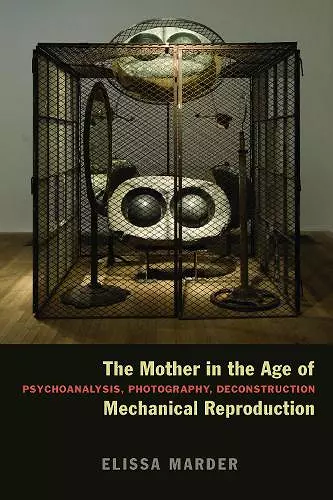The Mother in the Age of Mechanical Reproduction
Psychoanalysis, Photography, Deconstruction
Format:Paperback
Publisher:Fordham University Press
Published:7th Feb '12
Currently unavailable, and unfortunately no date known when it will be back
This paperback is available in another edition too:
- Hardback£74.00(9780823240555)

This richly imaginative theoretical study focuses on the uncanniness of the maternal function (not the biological mother), as this appears in philosophy, literature, popular culture, and photography-often in unexpected places.
This book analyses the relationship between the body, technology and language by focusing on the uncanny figure of the mother in psychoanalysis, photography, and literature and contends that the concept of human birth is represented through mechanical repetition and technological modes of reproduction rather than as a natural event.
This book grows out of a longstanding fascination with the uncanny status of the mother in literature, philosophy, psychoanalysis, film, and photography. The mother haunts Freud’s writings on art and literature, emerges as an obscure stumbling block in his metapsychological accounts of the psyche, and ultimately undermines his patriarchal accounts of the Oedipal complex as a foundation for human culture. The figure of
the mother becomes associated with some of psychoanalysis’s most unruly and enigmatic concepts (the uncanny, anxiety, the primal scene, the crypt, and magical thinking). Read in relation to deconstructive approaches to the work of mourning, this book shows how the maternal function challenges traditional psychoanalytic models of the subject, troubles existing systems of representation, and provides a
fertile source for nonmimetic, nonlinear conceptions of time and space.
The readings in this book examine the uncanny properties of the maternal function in psychoanalysis, technology, and literature in order to show that the event of birth is radically unthinkable and often becomes expressed through uncontrollable repetitions that exceed the bounds of any subject. The maternal body often serves as an unacknowledged reference point for modern media technologies such as photography and the telephone, which attempt to mimic its reproductive properties. To the extent that these technologies aim to usurp the maternal function, they are often deployed as a means of regulating or warding off anxieties that are provoked by the experience of loss that real separation from the mother invariably demands. As the incarnation of our first relation to the strange exile of language, the mother is inherently a literary figure, whose primal presence in literary texts opens us up to the unspeakable relation to our own birth and, in so doing, helps us give birth to new and fantasmatic images of futures that might otherwise have remained unimaginable.
"Marder's writing is beautiful and compelling. She deftly moves between philosophy, literature, film and popular culture to create novel interpretations of maternity, sex and death." -- -Kelly Oliver Vanderbilt University "In this intellectually luxuriant book Elissa Marder analyzes a whole series of effects that come into play by virtue of our being 'not present' at, yet haunted by, constantly mourning our birth. But her coup de genie is to conclude thereby that the relation to birth, and indeed the constitution of the maternal body, is prosthetic, even technological: we cannot not return to the birth that stays with us throughout our life, and we cannot not set about producing a variety of mechanical reproductions of the "experience." Marder explores those reproductions-- from Cixous to Racine and Mary Shelley, from Derrida to Blade Runner, infanticide and Abu Ghraib--with an extraordinarily uncanny set of intellectual and academic antennae, producing ingenious insights from a minutely attentive reading practice." -- -David Wills University at Albany-SUNY
ISBN: 9780823240562
Dimensions: unknown
Weight: unknown
320 pages